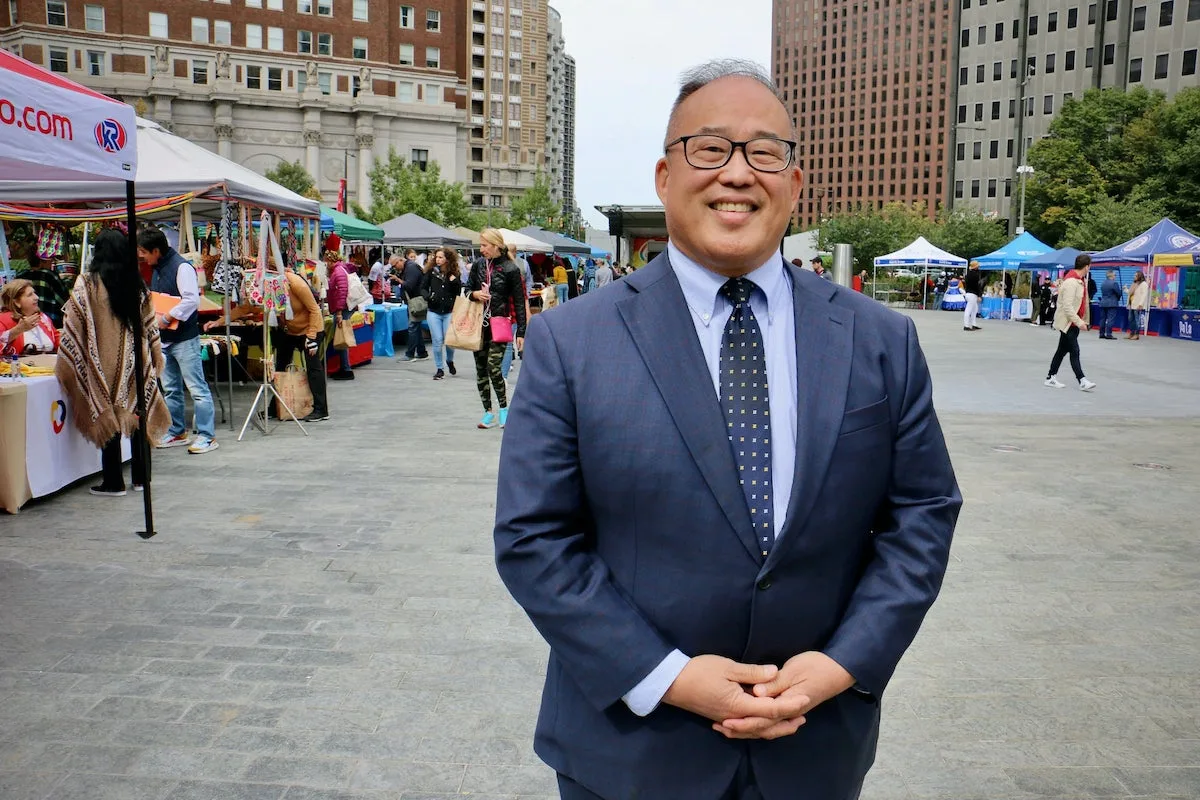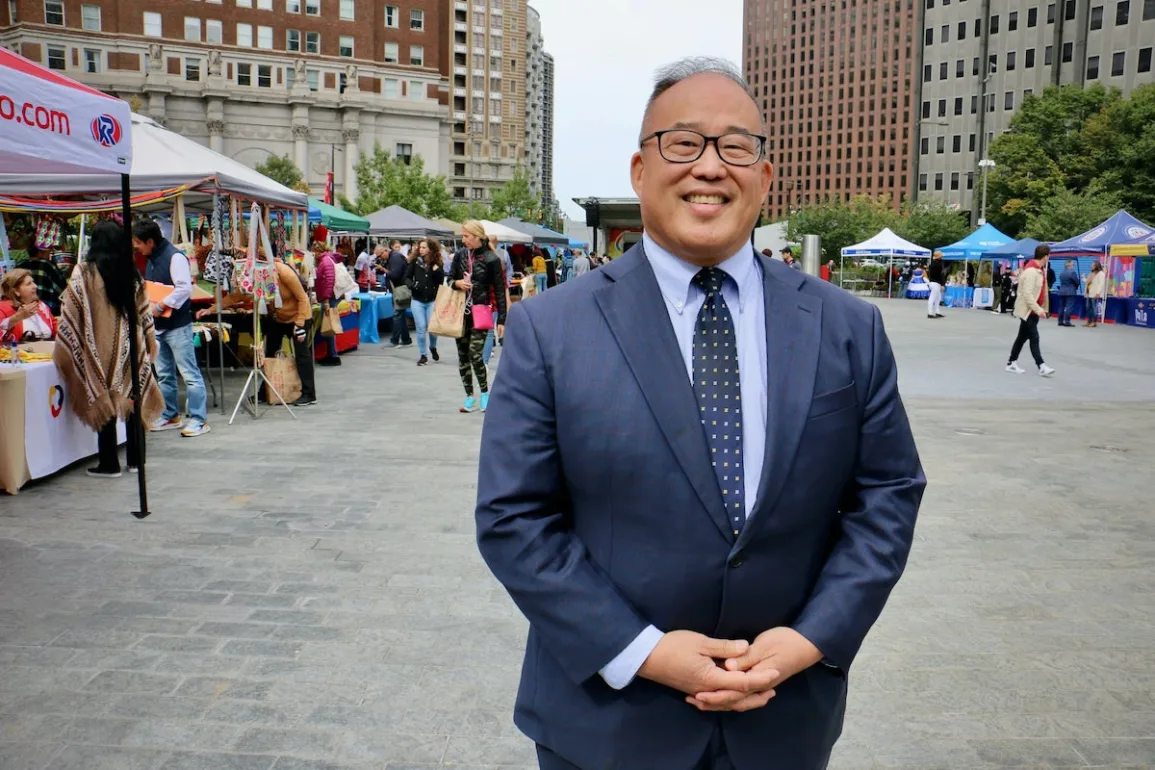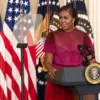
After all the votes are tallied Tuesday, Philadelphia will know who will be sworn in as its 100th Mayor.
Nominees from the two major parties, Democrat Cherelle Parker and Republican David Oh, each have the chance to make history, becoming either Philadelphia’s first Black woman or the first Asian-American elected to the position.
The two spent the final weekend of the campaign motivating their supporters to get out the vote. WHYY’s Morning Edition host, Jennifer Lynn, spoke with each nominee during this critical period.
From his campaign office in the Mayfair section of Philadelphia Thursday, Oh explained he’s not your typical Republican in a city where Democrats outnumber Republicans by a seven-to-one margin.
Note: This transcript has been edited for clarity.
Jennifer Lynn, WHYY Morning Edition host: You’re a former city council member.
You’re a lawyer, you’re a father, you’re a husband, and you are associated with the letter R.
What does the “R” stand for as you identify as being a Republican?
David Oh, Republican candidate for Philadelphia mayor: Well, definitely the R stands for Republican. I think, to me, I would describe myself as a Lincoln Republican. I’m very much a big fan of Abraham Lincoln, and I like the origins of the Republican Party. To me, the R stands for reasonable, practical, and really public service-oriented. To me, the R in Republican means that while there are two parties, one of them believes in the power and goodness of government — which is fine — but you also need a party that is for individual rights and does not want a government that is intruding or obstructing the individuality of each person.
Lynn: What’s an example of that, where you feel that the government is intrusive at the city level?
Oh: Well, first of all, I look at the property taxes and we’re a city of neighborhoods. There are some neighborhoods where people feel that taxes are very accurate and fair.
There are some neighborhoods where people want more taxes, but those are not the people I’m concerned about. We have a large group of people in the city who are losing their homes and when they look at the assessment on their property, it is nowhere near [where it should be] and we know that because we did an independent audit — the council did of the assessment methodology – and it came back below the industry standard. I did a bill in 2018 to halt the process until we corrected that and to stop the over-taxation of people. But the most impacted people in our city are low-income and poor, and we can hear their complaints constantly when we talk about, for example, the failure to respond to emergency situations. That’s a failure of government. When we talk about the failure to properly train and equip police officers, we then end up with the result of — you know — tragic, unintended consequences from failure to perform properly. So, what I would say is that government can easily take care of those things if it puts a little attention to the situation.
Lynn: I feel like you had a bird’s eye view of the city as an at-large councilperson. Were your hands tied at all because you were a Republican or because you are an Asian American? Was there anything like that in your service?
Oh: Well, primarily because I’m a Republican, I think, there was opposition to what I was doing. But what I was doing was very popular. For example, reimbursing public school teachers the money they pay out of their pocket to buy required school items. I found $10 million in unused tobacco settlement money that we were gonna lose anyway. I held a hearing. It was probably early enough in my career as a councilperson that I believed that if I tabled it, we could bring it back later. I have since learned that, no, that doesn’t happen when you table it — it never comes back. It doesn’t come back later. Or the way our budget works is the budget is very very soft. There are no real details to our budget. And so oftentimes a department will have too much money. We know that because, for example, this department has $50 million every year for the last 10 years. And after the budget passes, you know, $40 million is removed from that department every year. So that’s not a $50 million budget. It’s just holding $40 million. I think that’s how we’ve ended up in a bloated budget that is non-responsive to the people, and that’s why it’s not accountable. People don’t know where the money actually goes.
Lynn: As mayor of Philadelphia, should you be elected, that could look very attractive to Republicans who are running in the [2024] presidential election. When they come into the city, are you welcoming them, are you supporting them, are you giving them a pulpit?
Oh: Well, I’m welcoming any candidate Democrat, Republican, or whomever who wants to come to Philadelphia to the extent I have time for it. I’m a mayor running a city and a city that is overwhelmed with gun violence and crime and improper taxation, homelessness, and drug addiction. I don’t have a lot of time for the presidential candidates. Good luck to them. You know, what they’re doing is important to the country, but they’re not taking care of anything in our city. Not a pothole will be fixed by them. Now, in terms of me being a Republican, I am a Republican, but we’re a democratic city. I understand who my voters are. We’re a seven-to-one democratic city and most of them will be supporting Democrats.
You know, they didn’t elect me to get into national politics. They elected me to take care of the problems here in our city and that’s what I’m going to be focused on.
Lynn: Mayors do get pulled into, or raise their hand, to get involved with national politics…
Oh: Not me. So let me say this, I’m not interested in it and whatever other mayors want to do to get involved in all kinds of things, that’s fine. But I’m really kind of opposed to it. To be honest, I could see if our city was like this amazing city of jobs and opportunity, but we’re not. And I really think that the next mayor of this city should be a mayor who works really hard every day. No, summer vacation, no holidays. I think the mayor should be nose to the grindstone from early in the morning to late at night. All of this extra stuff that I see mayors doing seems to be, to me, not really in the best interest of the cities they represent. People will have their ideas about what they want for this nation. They have a vote, they’re gonna do that, but they didn’t elect me to get involved in that. They elected me to take care of the city’s problems. And I’m also kind of objecting to the fact that local elected officials really kind of expand their jurisdiction, beyond what their jurisdiction is. When I was on city council, council was trying to pass laws that we have no authority to pass. It sounds good, and people like it, but it’s not legal, right? And I’m an attorney, so I’m not supporting illegal ordinances of bills. I don’t care how good it makes people feel it. It is, to me, deceptive. There are so many things that the mayor needs to do: Public schools, public transportation jobs, criminal justice reform within our own city, policing, technology. You know, lots of things. I just don’t really believe that a mayor should be getting into extracurricular types of issues.
Lynn: What is the biggest misconception about David Oh in this city?
Oh: I think the biggest misconception is I was born and raised and live in Chinatown… because I’m Asian American. You know, they have certain ideas.
Lynn: Where were you born and raised?
Oh: Southwest Philly. I could just tell you that when I was a child, if I were speaking on this microphone right now, you would not have any idea who I was. I sounded just like every other African American kid in my neighborhood.
Lynn: Three descriptive words that describe the skill set you as mayor will have?
Oh: Visionary, objective, purposeful. That’s three.
WHYY is your source for fact-based, in-depth journalism and information. As a nonprofit organization, we rely on financial support from readers like you. Please give today.



